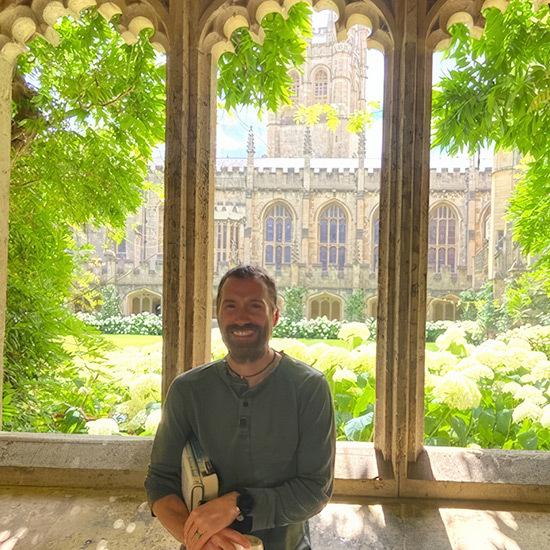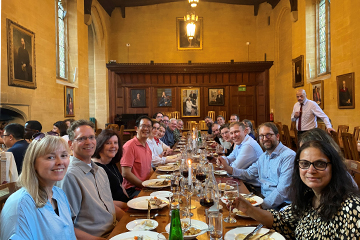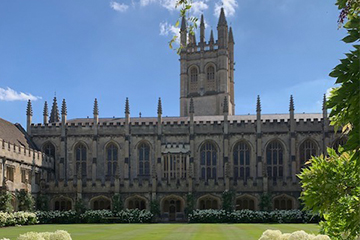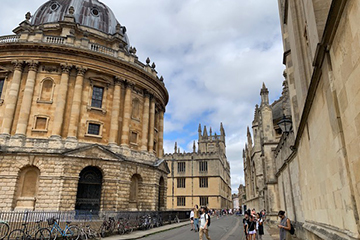Sports Medicine Professor Hunter Paris Advances Research and Builds Community through Oxford’s Harris Manchester College Fellowship Program

Great halls of libraries led Hunter Paris, Seaver College associate professor of sports medicine, to unexpected tables of fellowship at the University of Oxford’s Harris Manchester College Summer Research Institute.
 Harris Manchester Fellows dining together
Harris Manchester Fellows dining together
From June 29 to July 6, 2025, Paris represented Pepperdine University at Oxford’s prestigious summer fellowship program, which hosted a cohort of globally-based academics. All were offered access to the university’s libraries and resources along with lodgings in renovated 17th-century accommodations, including a recently opened clock tower building that served as Paris’ residence for the week.
Initially Paris intended to dedicate the week solely to archival research on human physiology. He sought to investigate the anthropology of high-altitude locations of East Africa, discuss field-based research with local physiology experts, and examine training journals of recording-breaking athletes—such as that of Oxford alumnus Sir Roger Bannister, neurologist and middle-distance runner who completed the first sub-four-minute mile.
While Paris did fulfill all his research goals, he considers the value of this opportunity to have transcended scholastic pursuits. Visiting fellows not only conducted research in the same libraries, but they dined and dwelt together—sharing cultures and life stories while immersing themselves in the ambiance of the renowned university.
 Magdalen College where C.S. Lewis was a tutorial fellow
Magdalen College where C.S. Lewis was a tutorial fellow
“That was part of the unexpected magic,” says Paris. “When I was originally presented this application, I knew the fellowship would be an amazing opportunity because I could get in a whole week's worth of research from sunup to sundown. But after a week of being together with new colleagues, I felt a kinship with them, experiencing their personalities and aspirations, and came to greatly enjoy their company.”
The daily rhythm of Paris’ weeklong stay included daybreak archival research followed by convening for meals in the spacious Arlosh Hall, a dining commons of late-Victorian style. Afterward Paris would explore the Oxford grounds, following cobblestone roads that brought him to various monuments such as Pembroke College’s Tolkien memorial and the Great Hall of Christ Church, a filming location for notable scenes in the Harry Potter movie series.
“I believe the blessings and celebrations of centuries ago still exist within the fabric of those walls,” Paris shares. “You can feel the words, whispers, movements, patterns, and feelings of the ages just being inside. I wish for many more Pepperdine staff and faculty members to go and have the doors of the Great Hall opened and to sit in the libraries.”
 Oxford's Radcliffe Camera, part of the Bodleian Library complex
Oxford's Radcliffe Camera, part of the Bodleian Library complex
Since his return Paris continues to discuss field-based research with physiologists he met there, whom he now considers colleagues. He likens the community cultivated at the Harris Manchester fellowship to that at Pepperdine University where he has built friendships with faculty outside of his department, such as professors of the Great Books program. Such interdisciplinary connections, he believes, further refine his perspective as a scientist.
Paris reflects that impressions of the University of Oxford and its summer fellowship remain with him still, shaping aspects of his life such as emphasizing pedagogical practices of community and compassion.
“I find the times that I have leaned into meeting new colleagues and students allows my research endeavors to become much fuller,” says Paris. “I believe it is part of our mission as human beings—no matter whom we talk with or where we go—to be open-spirited enough to allow the goodness of a place or community to permeate into us and then spread that goodness onward.”